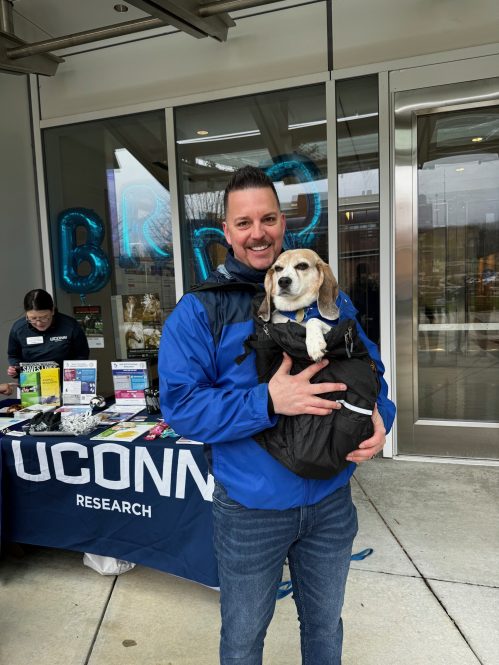UConn takes careful steps to ensure that all biomedical research is conducted safely and with integrity. On April 18, several members of the Office of the Vice President for Research (OVPR) were on hand during a celebration of their mission, complete with a live mascot who embodies responsible practices.
Biomedical Research Awareness Day (BRAD) takes place annually on the third Thursday in April. The observance allows UConn and other institutions to educate others on the important roles that animals and humans play in biomedical research.
Units within the OVPR’s Office of Research Integrity and Compliance are dedicated to supporting biomedical research and promoting best practices. On that Thursday, the members of the unit, including the Institutional Animal Care and Use Committee and Animal Care Services hosted a booth on the Storrs campus to inform UConn students and staff. They also presented a webinar and held a reception.
“UConn regards the use of animals in research, teaching, and testing to be an integral component of continued progress in science, education, and agriculture,” said Karen Moré, the director of research integrity and compliance. “We are committed to maintaining the highest standards of humane animal care, welfare, and regulatory compliance in our research and teaching endeavors and we expect our animal facilities and programs to maintain high ethical standards for animal care and use.”
BRAD gave the team an opportunity to spotlight a furry retiree, Fenway the beagle. The dog was a former research subject (not at UConn), and his retirement is an example of the humane methods UConn championed during this BRAD day event.
UConn is accredited as an AAALAC institution, an international non-profit organization dedicated to humane treatment of animals in science. The accreditation is internationally recognized as a signal of an institution’s dedication to high quality, ethical programs of animal care and use.



